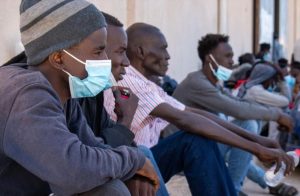Sahara the latest deadly trap for migrants – report
The Sahara Desert is now more deadly than crossing the Mediterranean for migrants seeking to get to Europe, a new report says.
The report, titled ‘On this journey, no one cares if you live or die’, published by the UN agencies UNHCR and IOM, says that migrants face danger from criminal gangs and a lack of humanitarian support.
More migrants and refugees are embarking on dangerous journeys across Africa towards the southern shores of the Mediterranean Sea where they face growing risk of abuse such as kidnapping and organ theft, the report said.
The routes crisscrossing the Sahara northwards from West and East Africa are thought to be twice as deadly as the better-documented central Mediterranean Sea route where already more than 800 people are thought to have drowned this year, the report said.
Vincent Cochetel, UNHCR Special Envoy for the Western and Central Mediterranean, said the report was based on interviews with more than 30,000 migrants between 2020-2023.
“Everyone that has crossed to Sahara can tell you of people they know who died in the desert,” he told said.
“We cannot lose our capacity to get outraged by this level of violence along the route. Some of it can be addressed,” he added calling for more protection services and search and rescue missions.
The report cited local conflicts in parts of the arid Sahel belt and a civil war in Sudan as driving factors, as well as climate change and growing racism along the route.
 Nearly one in five of the migrants (18 per cent) said they feared kidnapping and a growing number feared sexual violence (15 per cent), the survey showed.
Nearly one in five of the migrants (18 per cent) said they feared kidnapping and a growing number feared sexual violence (15 per cent), the survey showed.
Hundreds have fallen victim to organ traffickers, Mr Cochetel said, either selling them to survive or being robbed.
“Most of the time people are drugged, the organ is removed without their consent,” he said.
While migrants cited smugglers as being among their abusers, they also named criminal gangs and state officials such as police and border guards who had in some cases dumped migrants on the other side of their borders, Mr Cochetel said.
“Much of this is happening in a situation of near complete impunity. We should really follow the money and catch the big guys.”
The report said the first danger migrants and refugees speak of is attacks by criminal gangs that rob them of all their possessions.
It said women face a higher risk of sexual violence on these routes. There is also violence from smugglers or threats from traffickers: extortion, forced labour, and sometimes sexual exploitation.
The dangers also come from border authorities, who abuse their position to extort money from these unfortunate individuals, not just on routes to North Africa or Europe by sea, but also on routes within and to the south of the African continent.
The report cited instances of people dying in the desert, people who fell from trucks and were not picked up by the smugglers, and sick people abandoned in the middle of nowhere.
Most people surveyed said they had seen bodies along these roads in southern Algeria, northern Niger, and southern Libya, but also in other parts of the Sahara.
When asked, “Do you know anyone who died at sea?” the responses are much fewer, the report said.
The report said the Sahara was a ‘black hole’ for humanitarian support.
“There are many black holes, where very few people have access. For international organisations, it is very difficult to go there due to extreme geographical conditions and because some governments do not want humanitarian organisations to witness this secret and unspoken violence,” the report said.
“The phenomenon of deaths in the desert gets much less media coverage because it is less visible than a boat in distress in the Mediterranean.
“Humanitarian organisations need to find other channels of information: working more with traditional leaders and local authorities, who are witnesses and sometimes victims of these gangs. They need to work on a system for searching, identifying, and referring these people who control small towns and oases along these routes,” the report said.












